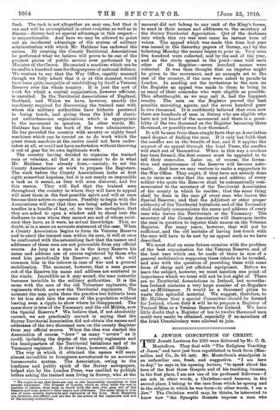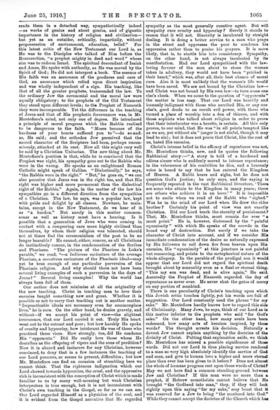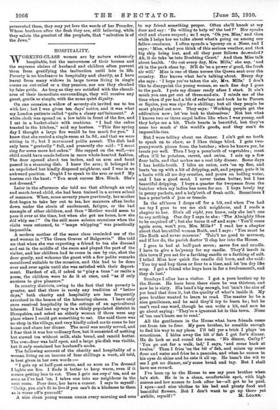A JEWISH CONCEPTION OF CHRIST, T HE Jewett Lectures for 1910
were delivered by Mr. C. G. Montefiore. They deal with " The Religions Teaching of Jesus," and have just been republished in book form (Mac- millan and Co., 2s. 6d. net). Mr. Montefiore's standpoint is an aafFeeiliar one, fresh, and suggestive. "I am here to-day," he says in his opening lecture, "to speak about the hero of the first three Gospels and of his teaching, because, in the first place, I am not one of his professed followers—I am not, in other words, a Christian—and because, in the second place, I belong to the race from which he sprang and to the religion in which he was born—in other words, I am a Jew." The Christian world may, he thinks, be interested to know how " the Synoptic Gospels impress a man who reads them in a detached way, sympathetically indeed —as works of genius and about genius, and of gigantic importance in the history of religion and civilisation— but yet as an outsider, critically, impartially, without prepossession of environment, education, belief." For this latest critic of the New Testament our Lord is, as He was to the Disciples who talked of Him before the Resurrection, "a prophet mighty in deed and word" whose aim was to redeem Israel. The spiritual descendant of Isaiah and Amos, He spoke with authority, as He was moved by the Spirit of God ; He did not interpret a book. The essence of His faith was an assurance of the goodness and care of God, an assurance which relied upon direct inspiration and was wholly independent of a sign. His teaching, like that of all the greater prophets, transcended the law. To the ordinary Jew the ceremonial and the moral law were equally obligatory; to the prophets of the Old Testament they stood upon different levels; to the Prophet of Nazareth they were incomparable. Yet the difference in the teaching of Jesus and that of His prophetic forerunners was, in Mr. Montefiore's mind, not only one of degree. He introduced a principle of moral progress which the Rabbis realised to he dangerous to the faith. " Moses because of the hardness of your hearts suffered you to "—do so-and- so, He said ; and the orthodox Jew perceived that the sacred character of the Scripture had been, perhaps uncon- sciously, attacked at its root. Now all this might very well be said by a Christian Unitarian. The new thing about Mr. Montefiore's position is that, while he is convinced that the Prophet was right, his sympathy goes out to the Rabbis who were in the wrong. He speaks as an enlightened Roman Catholic might speak of Galileo. "Dialectically," he says, " the Rabbis were in the right." " But," he goes on, " we can also perceive that Jesus was in the right too, and that His right was higher and more permanent than the dialectical right of the Rabbis." Again, in the matter of the law his sympathies go in a different direction from the sympathies of a Christian. The law, he says, was a popular law, kept with pride and delight by all classes. Nowhere, he main- tains, except in the New Testament, do we hear of it as "a burden." But surely in this matter common- sense as well as history must have a hearing. Is it possible that a generation of Jews who were coming in contact with a conquering race more highly civilised than themselves, by whom their religion was tolerated, should not at times feel the ceremonialism of the past to be no longer bearable ? He cannot, either, concur, as all Christians do instinctively concur, in the condemnation of the Scribes and Pharisees. " The picture of the Pharisee in Luke's parable," we read, "—a ludicrous caricature of the average Pharisee, a monstrous caricature of the Pharisaic ideal—may yet be true enough of one particular perversion of the Pharisaic religion. And why should there not have been several living examples of such a perversion in the days of Jesus? " Several living examples ! Why the world has always been full of them.
Our author does not minimise at all the originality of the new teaching. Christ in teaching men to love their enemies taught something new and great. Whether it is possible or not to carry that teaching out is another matter. "Impracticable ideals are necessary even for commonplace lives," he is sure. On the other hand, he denies gravely, and without—if we accept his point of view—the slightest irreverence, that our Lord carried it out. Truly His heart went out to the outcast and poor ; but how harshly He spoke of cruelty and hypocrisy, how intolerant He was of those who practised these vices. How strongly, too, did He condemn His " opponents." Did He really love those whom He describes as the offspring of vipers and the sons of perdition? Now it is absurd and insincere for any Christian, however convinced, to deny that in a few instances the teaching of our Lord presents, or seems to present, difficulties ; but how Mr. Montefiore can find an occasion of stumbling here we cannot think. That the righteous indignation which our Lord showed towards hypocrites, the cruel, and the oppressive rich is inconsistent with the conception of Christ which is made familiar to us by many well-meaning but weak Christian interpreters is true enough, but it is not inconsistent with Christ's own teaching in the Gospel, so far as we can see. Our Lord regarded Himself as a physician of the soul, and it is evident from the Gospel narrative that He regarded sympathy as the most generally curative agent. But will sympathy cure cruelty and hypocrisy ? Surely it stands to reason that it will not. Sincerity is inculcated by straight dealing. It is doing a better service to a man who prays in the street and oppresses the poor to condemn his oppression rather than to praise his prayers. It is more likely, that is, to startle him into consistency. Sympathy, on the other hand, is not always inculcated by ita manifestation. Had our Lord sympathised with the law- loving fervour of the men about to stone the woman taken in adultery, they would not have been " pricked in their heart," which was, after all, their best chance of moral cure. Also it is most unlikely that the woman's life would have been saved. We are not bound by the Christian law— and Christ was not bound by His own law—to turn some one else's cheek. When we come to the question of "opponents" the matter is less easy. That our Lord was heartily and humanly indignant with those who ascribed His, or any one else's, good deeds to an occult evil power, with those who turned a place of worship into a den of thieves, and with those sophists who talked about religion in order to prove that their interlocutor was a heretic, is certain. All this only proves, to our mind, that He was " in all points tempted like as we are, yet without sin" (anger is not sinful, though it may lead to sin); but it does not prove that Christ, like the rest of us, hated His enemies.
Christ's intense belief in the efficacy of repentance was not, Mr. Montefiore thinks, new, and he quotes the following Rabbinical story :—" A story is told of a hardened and odious sinner who is suddenly moved to intense repentance; in the vehemence of his contrition he dies, and a heavenly voice is heard to say that he has entered the Kingdom of Heaven. A Rabbi hears and sighs, but he does not question God's justice; he only says, and the saying is frequently repeated in the vast Rabbinical literature, ' There are some who attain to the Kingdom in many years; there are others who achieve it in an hour.' " It is impossible not to smile when we read of the Rabbi who " sighed." Was he in the mind of our Lord when He drew the elder brother ? Certainly his point of view was not exactly Christian. Did our Lord teach the eternity of punishment ? That, Mr. Montefiore thinks, must remain for ever " a moot point." He is, however, distressed by the " painful equanimity" with which He speaks of the crowds in the broad way of destruction. But surely if we take the character of Christ into account, and if we consider Hie immediate condemnation of the desire so naturally expressed by His followers to call down fire from heaven upon His enemies, His " equanimity " at this juncture is not painful but reassuring, and points to the metaphorical nature of the whole allegory. In the parable of the prodigal son it would appear that our Lord did not regard the spiritual death brought about by sensuality even as a final or eternal thing.
This my son was dead, and is alive again," He said. Assuredly the Prophet of Nazareth regarded the day of repentance as never over. He never shut the gates of mercy on any portion of mankind.
There is one peculiarity of Christ's teaching upon which this Jewish critic touches lightly, yet his words are full of suggestion. Our Lord constantly used the phrase "for my sake." Mr. Montefiore hardly knows how to regard this side of Christianity. Many Jews, he says, think of our Lord as is this matter inferior to the prophets who said "for God's sake." On the other hand, how many souls have been redeemed, how many acts of heroism inspired, by then words ? The thought arrests his decision. Naturally a devout Jew cannot explain anything by the doctrine of the divinity of Christ. Putting that explanation aside, we think Mr. Montefiore has missed a possible significance of thew words. Did not our Lord in thus placing service rendered to a man so very high absolutely identify the service of God and man, and give to human love a higher and more eternal place than ever has been given to it before ? Does not almost the whole of humane progress rest upon these words of Christ? May we not here find a common standing-ground between Jew and Christian? If this man were no more than a prophet, if Hebrew monotheists cannot believe that He brought " the Godhead into man," they, if they will look rightly upon this saying "for my sake," may boast that it was reserved for a Jew to bring "the manhood into God." While they cannot accept the doctrine of the Church which has
persecuted them, they may yet love the words of her Founder, Whose brethren after the flesh they are, still believing, while they salute the greatest of the prophets, that " salvation is of the Jews."
























































 Previous page
Previous page